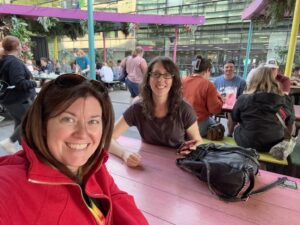So, what will I do after I finish my PhD?

There is a question I get all the time. Every year, for the past four years, someone has asked me some version of this mystifying question.
“But what will you do when you finish your PhD?”
“So obviously you’re going to teach at the university when you finish?”
“Tell me, have you got a plan for when you finish your PhD?”
I would like to believe that most people are genuinely curious about my career plans, but to be honest, this question isn’t always asked in good faith. Does anybody really care what I want to do with my PhD? What if I did it just for fun, and I don’t have any plans at all. Is that an acceptable answer? (No, it’s not — I tried that answer once and there was a lot of stunned confusion).
There is another sentiment behind this question. Because what people often want to know is: Why did I waste all that time and money on a PhD if I can’t actually use it for anything?
They want reassurance that the end result must be: money, fame, notoriety, something! That I must have some master plan. Because if I don’t have a plan, then clearly I did something incredibly stupid.
Wouldn’t that be funny?
If a PhD is meant to signify that I am smart, yet I wasted my money on something I can’t use, then – aha! I have actually done something very dim-witted. It is the absolute gotchcha moment for people who never really believed in me in the first place <insert shrug here>.
And it’s why — when someone asks me this question — I don’t usually tell them the truth. I don’t specifically lie, but if the question seems motivated by a deep-desire to prove that I have wasted my time and money, then it’s my belief that they don’t deserve to know the real answer. I know the cards I have been dealt at the poker game of post-doctoral life, but that doesn’t mean I have to show them. Throughout the whole doctoral process, I have learned that some people want the worst for me. They want me to fail. Or their support is only available until they are proven right when my plans don’t work out, and I’ll have to return to a corporate job so life can finally go back to “normal”. In their mind: I have made a bet, and lost. Thank god they didn’t make the same mistake as me!
But, I haven’t made any mistakes. And I haven’t failed. Even though, I have genuinely experienced a lot of failure. I’m not afraid of failure. And weirdly, I feel closer to my dreams now than I have before.
Still, I am cautious about who is allowed to hold my dreams. These are wiggly things. Squirmy manifestations that feel like holding jelly in your hands. Dreams are runny, and easily bruised. So, I am more careful about who deserves to hear them. It matters because there are people who pretend to care about my dreams, when what they really want is to simply feel smugly smarter than me for a moment.
Maybe a PhD is a waste, but mine wasn’t
Most people who start a PhD aren’t motivated by proving they are super-mega-smart. It’s not an IQ test. And it’s not like winning an Olympic medal. I was never looking for intelligence validation. And seriously, nobody really cares about getting the title of “doctor” especially since we aren’t medical doctors. I always say that anyone can start a PhD, but not everyone can finish one. And now that I’m nearing the end of my degree, I can tell you that the only qualities you need to finish a doctoral degree are: curiosity, self-motivation and time management.
These sound like pretty simple qualities but, take these traits to their most extreme ends, and push them to the absolute limit, and you will find that alot of people who do PhD’s for the wrong reason, will often give up.

The postgraduate room on the 4th floor 50 George Square
Can you be so self-motivated that you will work full-time, travel every six weeks, manage two calendars in two time zones, schedule your emails, and apply for over fifty scholarships knowing you will lose most of them? Can you be so curious that you will continue to pursue your craft in the face of unrelenting rejection for years, yet continue to believe in yourself when you see others succeeding, even while you are struggling? Can you challenge yourself to go deeper into your own creative practice while also getting multiple rejections on days like your birthday? Can you manage your time to maintain friendships, family, and romantic relationships? Will you remember holidays and birthdays, schedule down-time, and hug your friend when her mother dies, make her food, and send her the last recording you took of her mom a year later when she is under the weight of crushing sadness? Push these qualities to their most extreme and then ask if it’s all worth it just to be called doctor? The ego simply cannot last. I’ve never seen it. What I have seen are students who push ahead when they are miserable, and that misery is the opposite of what you want to feel.
Because in my mind, a PhD is a manifestation of self-love. There is so much love required to take on a project to pursue your own curiosity, interests, and inner-reflections. You must love yourself enough to know when to take a break, to reach out to your supervisor for help, to admit you don’t know something, and to talk to other PhD students who are in similar situations. A PhD is ultimately a pursuit of love. My own research is self-reflective: yes, I am writing a crime novel. And yes, I am examining the craft of setting and liminal places. But why?
I wanted to write a story set in my own city, and through that story, I wanted to examine my own internal beliefs, morals, and ethics. In some ways, I wanted to write about my own life, and my own upbringing in a city that hasn’t always been kind to me, or to others. I am motivated by a deeper understanding of how and why I am creative in the first place. Where does my creativity come from? And what tools am I using? What questions do I have about society, my nation, and my perceptions of what I am witnessing? Do I have the skill and creative capability to put my thoughts and feelings into a fictional narrative?
A PhD is about self-love
There are absolutely students who hate their PhD’s. They don’t like their supervisors. They are frustrated with their topic. Or they are unhappy with the results of their work. Maybe they were pressured or expected to complete higher education. Maybe their parents wanted it. Or they were scared to get a job in the “real world”. Maybe academia is a place where they feel comfortable and accepted, or maybe the university is a place to hide or seek refuge. PhD’s can be gruelling, frustrating, weird, and painful. But they can also be fruitful, inspiring, challenging, and illuminating.

Hanging out with Nadine and talking PhD’s at the Edinburgh Street Food Market
I don’t think I could have made the decisions I made unless I pursued this degree out of a motivation for self-love and discovery. I have explored the inner recesses of my brain, and the corners of my heart, to really untangle the meaning behind my work, and the motivation for doing a doctoral degree in the first place. My choices are also not just mine. My mother, who I had lunch with today, never saw herself as someone smart or talented. She was never encouraged to go to school, or pursue her own creativity. Her coworkers think she is a millionaire for “paying for my education” but in reality, it is my hard work of applying for scholarships and grants, plus my own “future work” that is paying the bill. Nobody handed a blank cheque to me. And they never will.
But that hasn’t stopped me.
Even if my PhD results in nothing: No job. No money. No keynote speeches. No critical acclaim. It doesn’t matter. My degree was a pursuit of love. Of my own curiosity. Of my own artistic practice. I put pause on my artistic dreams in my teenaged years because I took the safer path of a career in advertising and then in public relations. Believe it or not, but I originally was accepted into art school for glassblowing. And I backed out of it. Then later, feeling slightly out of place at a PR agency in Toronto, I took a night class in culinary school because I love food and cooking (and quickly learned I was not cut out for it – mad respect to the chefs). It was years later when I got an undergraduate degree in communications before I did the crazy thing, and threw a hail mary, and applied for creative writing at Edinburgh. Was I always dreaming of an academic life? No. Never. I didn’t know it was even an option. I wanted to be a writer. And an artist. But a funny thing happened in Edinburgh. The city believed in me. And then an even more curious thing happened. I believed more in myself.



